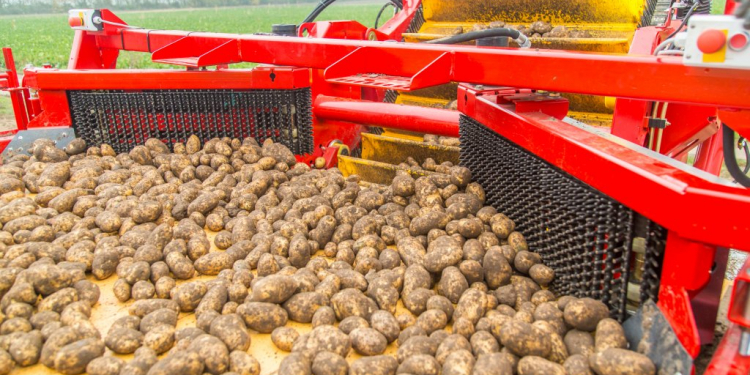For decades, the University of Maine has devoted valuable agricultural research to studying how to improve potato crops, a central element of the state’s agricultural economy.
Over the past year, the focus of the program’s mission has ramped up with one particular goal in mind: make potatoes that are resistant to climate change.
While warmer temperatures may extend the potato growing season in Maine, they can also cause problems with the crop’s qualities and diseases, said Gregory Porter, a professor of crop ecology and management at UMaine. Porter is the lead investigator for the school’s potato breeding program, which works on projects from improving marketing opportunities for growers to developing potatoes that are more resistant to diseases like potato virus Y.

Developing a potato that is resistant to the changing climate is more important now than ever. Maine is coming off of a banner year for potato crops thanks in large part to the success of the Caribou russet
“The predictions for climate change are heavier rainfall events, and potatoes don’t tolerate flooding or wet conditions for long without having other quality problems,” Porter said. “If we want potatoes to be continued to be produced successfully in Maine, we need to be able to produce varieties that can be resistant to change.”
Heat and floods aren’t the only factors. Pests like the Colorado potato beetle and disease-spreading aphids have flourished with the changing climate, said Jim Dill, pest management specialist at the University of Maine Cooperative Extension. Breeding seemingly small changes in potato morphology — for example, hairier leaves that make it difficult for insects to move around on the plant — can cut down on pests’ destruction and also the needs for pesticides.
Funders have caught on as well. On Nov. 9, UMaine received a total of $510,104 to conduct research on potato breeding in Maine through the U.S. Department of Agriculture’s National Institute of Food and Agriculture.
“The weighting of the effort in the new grant steps up our attention on heat stress and tolerance to flooding that will occur due to climate change,” Porter said.
Breeding such characteristics into potatoes is a long process of cross-pollinating different potato varieties until they produce the seeds for a new variety, which come in green pods that look more like under ripe cherry tomatoes than the sprouting seed potatoes most home gardeners are used to.
Then the potatoes are tested at different sites in Maine and across the country, not just for the growing properties they were selected for like heat tolerance and pest resistance, but also for qualities like yield, shipping durability and — of course — taste.
“It takes 10 years of selection after that initial cross pollination, and it might take two to five years before enough commercial evaluation has taken place to release a new potato variety,” Porter said. “There are so many required characteristics for a variety to be successful, we’re simultaneously trying to select for improvement in 50 or more traits. It’s really hard to get all of those positive traits into a plant variety. That’s why it takes such a sustained effort.”
The breeding process that Porter and his collaborators employ is different from genetically modifying a potato, which can yield a new variety much faster. Though Porter thinks that genetically modified crops have their place — for example, if you are looking to give a crop a characteristic that is completely new — there are advantages to the slow-and-steady potato breeding process.
“One of the advantages of what we do is you can combine a really wide range of improvements into a single variety,” Porter said. “You have the potential advantage of something that is new and improved in really unique ways. For many things we need in potato improvement we have the characteristics available, we just need to cross the parents in the right way.”
Porter doesn’t yet have a sense of when the climate change-resistant potato varieties will be ready for market, but they are in a research testing phase right now at sites throughout the United States. For example, potatoes are in places like Virginia, North Carolina and Florida to test high temperature stress, and disease pressure in Pennsylvania.
“As we get a few that look good, we will put them out there to industry and see if they’re worthy of adoption,” Porter said.
As for a punchy, marketable name like Caribou russet? Hard to say at this point, but Porter said he’s thinking about it.
“I spend a lot of time driving between here and Aroostook County and that gives me a lot of time to think about variety names,” he said.






